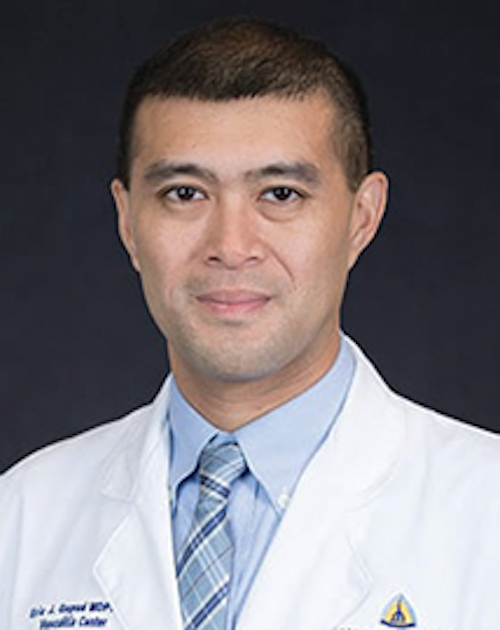Eric Gapud, MD, PhD
The Johns Hopkins University School of Medicine
When Eric Gapud, MD, PhD, was in medical school, he was diagnosed with an autoimmune disease. As you might expect, he can empathize with the experiences of his patients, particularly those with vasculitis and anyone who has been diagnosed with a rare disease. A physician-scientist, Dr. Gapud is also an instructor of medicine on the junior faculty at the Johns Hopkins University School of Medicine in Baltimore, Maryland. His area of clinical expertise is rheumatology with a sub-specialty in vasculitis.
“I’ve been very fortunate as a patient in that my condition has been stabilized with a biologic,” Dr. Gapud said. “I had a smart doctor who took care of me, who I’ve always admired.” Wanting to do the same for others, Dr. Gapud is taking the opportunity as a clinician and researcher to give back.
“Vasculitis is among the rarest and probably the least understood condition that rheumatology, as a whole, deals with,” Dr. Gapud noted. “I’ve always been captivated by that.” His interests include mechanisms and patient outcomes for antineutrophil cytoplasmic antibody (ANCA)-associated vasculitis, giant cell arteritis, Behcet’s disease, and Takayasu arteritis.
Dr. Gapud’s training is partially funded by the Vasculitis Foundation. “The VF is pleased to support Dr. Gapud’s training through the Dr. Darwin James Liao Memorial Fund,” said Joyce Kullman, VF Executive Director. “We must encourage the next generation of physician-researchers to choose the field of vasculitis to ensure that our patients receive the care they need.”
Dr. Liao was an ophthalmologist, entrepreneur, and inventor in the Seattle, Washington, area. He passed away from complications of eosinophilic granulomatosis polyangiitis (EGPA) in December 2013. Dahlia Mak is the family representative for her brother’s memorial fund held at the VF.
“Darwin’s sudden passing from EGPA was absolutely heartbreaking,” said Mak. “It is why improving vasculitis research, awareness and treatment continues to be critically important to our family. We believe that helping clinicians and patients learn more about vasculitis and best practices in treatment will facilitate more timely diagnosis and care.”
Dr. Gapud divides his time between seeing patients in the Johns Hopkins Vasculitis Center, while conducting molecular immunology research on rheumatic disease mechanisms. Through his current research he has found that most researchers have thought that the function of the molecules involved in the immune system’s response was to kill cells, causing tissues to function abnormally. Using kidney disease in ANCA-associated vasculitis as a model, Dr. Gapud’s research suggests that there may be another side to this that has been underrecognized.
“We think by understanding this different set of immune functions that we may be able to further subtype patients and then eventually correlate this with greater precision, like a diagnosis or what a person’s chances are, for example, of progressing to having lung or kidney issues,” he said. “Or if we treat you with agent X over agent Y, will you be more or less likely to do better?”
Dr. Gapud earned both his MD and PhD in molecular immunology through the Medical Scientist Training Program at Washington University in St. Louis, Missouri. He then completed his internship and residency in internal medicine at Washington University at St. Louis/Barnes Jewish Hospital followed by a fellowship in rheumatology at the Johns Hopkins University.
“There’s something about vasculitis, the way it manifests in such a nonspecific way,” Dr. Gapud said. “That means a lot of detective work for the clinician.” Even though progress has been made, Dr. Gapud said he is struck by how little we know: Where do these diseases come from? Why do some of the things we prescribe, like rituximab, work? How do we better predict outcomes? Who’s going to flare and who’s not? Who really needs the high-intensity suppression and for how long?
Dr. Gapud said his research will continue indefinitely, as these are important questions that need answers. “We’re finding what we think might be important lessons that could be extrapolated broadly to study autoimmunity and immune function in general,” he said. With the ability to subtype disease, there’s the hope of finding key elements of these pathways that might actually represent novel therapeutic strategies. “It could suggest ways in which certain biologics or other drugs could be used in unexpected ways to treat disease with potentially fewer side effects. Ultimately that is the goal.”
“The hope is that with the help of resources like what I’ve been fortunate to have received from the Vasculitis Foundation, that we can continue this work and use it as a springboard for additional research,” Dr. Gapud said.
Dahlia Mak said her family is excited to support Dr. Gapud’s work at the Vasculitis Center at Johns Hopkins. “We anticipate that Dr. Gapud’s work will be impactful, from breakthroughs in vasculitis research to acceleration of improvements in patient care,” she said.


